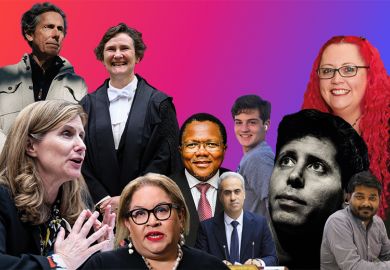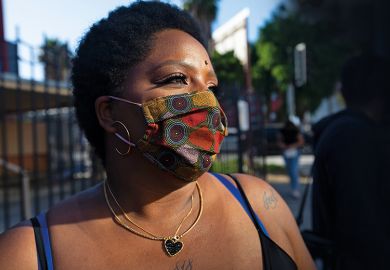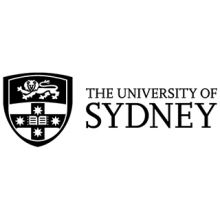Rachael Gunn
The Paris Olympics were Australia’s most successful, but the standout performance came from a competitor who failed to win a single point. Macquarie University cultural studies lecturer Rachael Gunn – aka Raygun – suffered a global pile-on after footage of her kangaroo hopping-inspired breaking routine went viral. Claims that her selection had been rigged overlooked her victory in the 2023 Oceania Breaking Championships. And some judges rated her ahead on some scoring criteria – particularly originality – against far younger, world champion opponents in an art form as much about creativity as wild athletic spinning. Nevertheless, she was decried as a symbol of the academic “bubble world” where “the attempt” matters more than ability. Raygun had the last laugh after she signed with a talent agency to exploit her profile as a brand ambassador and motivational speaker. “Becoming a meme is potentially worth a lot more than winning a medal,” The Sydney Morning Herald observed.
John Ross
Baroness Shafik
Policing Gaza protests has been a no-win situation for US university presidents. Those who let protesters set up encampments have been pilloried by Republicans for failing to tackle antisemitism, yet those which supported hard-line action faced accusations of betraying the academic community by kowtowing to political pressure. Baroness Shafik fell into the latter trap. In April, the Columbia University president survived a four-hour congressional hearing in which she stressed her willingness to take action when dissent crossed the line. Yet her appearance only served to inflame tensions on campus, sparking more protests that led to a cancellation of in-person classes. The decision to ask New York police to break up an occupation at Columbia’s Hamilton Hall, which saw officers storm the historic building and make dozens of arrests, may have placated some critics, but it did not play well internally. Over the summer, Lady Shafik announced she was leaving following “a period of turmoil where it has been difficult to overcome divergent views across our community”.
Jack Grove
Shitij Kapur
King’s College London is not top of the list of UK universities most in need of a fee rise yet its vice-chancellor, Shitij Kapur, has been at the centre of the funding battle that has consumed the sector this year. With institutions nationwide battling deficits amid an ever-dwindling unit of resource, Professor Kapur articulated what many know but are afraid to say: that funding per student needs to be closer to £13,000-a-year to restore some stability. That he said it at the Universities UK conference in front of the country’s education press meant it couldn’t help but attract attention. And, when the fee rise did finally come, the fact that it was well below this number at £9,535 has meant that it has generally been shrugged off by the public, paving the way for potential future rises. Funding woes are far from over but Professor Kapur’s point has always been that both the student and the taxpayer should pay more. Whether he also wins this second battle remains to be seen.
Tom Williams
Richard Scolyer
University of Sydney professor Richard Scolyer has converted advanced melanoma, a scourge in sun-drenched Australia, from a virtual death sentence to a curable disease. His revolutionary approach, developed with long-time collaborator and fellow Australian of the Year Georgina Long, involves administering immunotherapy drugs before tumour removal surgery so that the immune system is triggered by the whole cancer rather than its remnant cells. Credited with saving thousands of lives, Professor Scolyer is now focused on his own. He has become “patient zero” in an adaptation of his technique against the worst subtype of brain cancer. Average survival following diagnosis is 12 months; six months for those who eschew chemotherapy like he did because it suppresses the immune system. Eighteen months later, Professor Scolyer’s glioblastoma shows no sign of recurrence and lab data from his ordeal could revolutionise brain cancer treatment. “I’m blown away that I’m still here,” he said recently.
John Ross
Marc Miller
In a year defined by powerhouse sectors turning their backs on international students, none have gone further or faster than Canada. Following years of record immigration, a growing housing crisis and nosediving poll ratings, prime minister Justin Trudeau turned to his childhood friend Marc Miller for help. Although he has only been in the post of immigration minister for just over a year, Mr Miller, the son of a history professor, has already made quite the impact on the sector – slashing international student visa numbers, and introducing higher wealth requirements and new working regulations. And with an election next year, the University of Montreal graduate, who has faced dire warnings from the sector about plummeting enrolments, has suggested further measures may follow. Other sectors – notably Australia and the UK – will be keenly watching how the Liberal Party manages to balance domestic housing concerns with the financial pressures on their institutions.
Patrick Jack
Jo Phoenix
Divisions over free speech reached boiling point this year, following widespread tensions between students and UK universities on the Israel-Gaza war, and concerns about “cancel culture” on campus. But one case stood out more than others, grabbing headlines for the way it triggered strong, and often emotional, responses. Jo Phoenix, the professor at the heart of UK academia’s gender wars, won a tribunal against her former employer, the Open University, after a judge deemed she had faced a “hostile environment” and harassment from colleagues because of her “gender-critical” views. One of the most high-profile rulings of the year cut to the heart of wider societal divisions on gender issues, bringing into sharp focus how academic controversies can be a microcosm of wider societal beliefs. Labour’s pausing of the Higher Education (Freedom of Speech) Act means anxieties remain, ensuring these tensions are set to continue into 2025.
Juliette Rowsell
Charlie Kirk
For decades, courting what was seen as the lazy, liberal college voter was thought a waste of time for Republicans. But it is becoming clear that students – often white men – were energised by Donald Trump’s 2024 campaign in a new way. Charlie Kirk, a right-wing influencer and podcast host, played a defining role in that. Through the conservative mobilisation machine Turning Point USA, he organised rallies across dozens of colleges in swing states, drawing in thousands of students with the promise of free Make America Great Again caps, and the chance to watch him “own the libs” in debate. Videos of his takedowns of “woke” talking points were then repackaged and viewed by millions online, further widening his reach. For the next four years at least, colleges will be wary of Mr Kirk – a man who has the ear of the incoming president and has described colleges as a “scam”.
Patrick Jack
Xiang Zhang
To say Xiang Zhang’s tenure as president of the University of Hong Kong has been tumultuous is putting things lightly. It looked as though the mainland-born professor was in the clear when, in April, claims of misconduct were dismissed by an investigation into alleged mismanagement. However, he was once again thrust into the spotlight after the university’s governing council appeared to unilaterally reshuffle his management team, exposing a rift at the top of the institution. What followed was a public spat between Professor Zhang and the council, which was only resolved – publicly, at least – by the intervention of Hong Kong’s leader. Beyond campus politics, Professor Zhang’s time in office has coincided with increased crackdown on academic freedom in Hong Kong as Beijing’s grip on the island tightens. To some, the president represents a new era of Chinese influence and the end of the freedoms once enjoyed in Hong Kong.
Helen Packer
Brian Bell
When the last UK government called a rapid review of the graduate visa route, vice-chancellors feared only one outcome. But Brian Bell, the King’s College London professor who chairs the Migration Advisory Committee tasked with the exercise, had other ideas. Where many feared a stitch-up designed to axe a heavy migration driver in an election year, Professor Bell and his team overcame political pressure and a ludicrously short time frame to conduct a thorough analysis that started to address some of the flaws in a major part of the country’s offering to international students. Much to the relief of nervous universities, he also said the visa should stay unchanged. The battle proved to be the last the sector had with a Conservative Party that, shortly afterwards, suffered a heavy loss to Labour in the general election, heralding a more welcoming environment for international students. Legend has it that, had changes to the visa already been made, Labour would not have undone them, making Professor Bell’s intervention all the more important.
Tom Williams
Nahid Islam
When students took to the streets of Bangladesh to protest against controversial reforms to a quota system for government jobs, few expected much to come of it. Nahid Islam, 26, was one of the leaders of the protests. A former sociology student at the University of Dhaka, he was interrogated and tortured by authorities, only to be dumped unconscious under a bridge days later. If anything, the treatment of Mr Islam and his peers galvanised the resistance movement – and, despite government violence, protesters eventually forced autocratic leader Sheikh Hasina to flee the country, ending her 15-year reign. Mr Islam is now a minister in Bangladesh’s interim government. In a year when student-led anti-war protests have dominated headlines yet done little to change the fate of civilians in the Middle East, Mr Islam’s story shows the power that student movements still have to enact change.
Helen Packer
Register to continue
Why register?
- Registration is free and only takes a moment
- Once registered, you can read 3 articles a month
- Sign up for our newsletter
Subscribe
Or subscribe for unlimited access to:
- Unlimited access to news, views, insights & reviews
- Digital editions
- Digital access to THE’s university and college rankings analysis
Already registered or a current subscriber? Login










